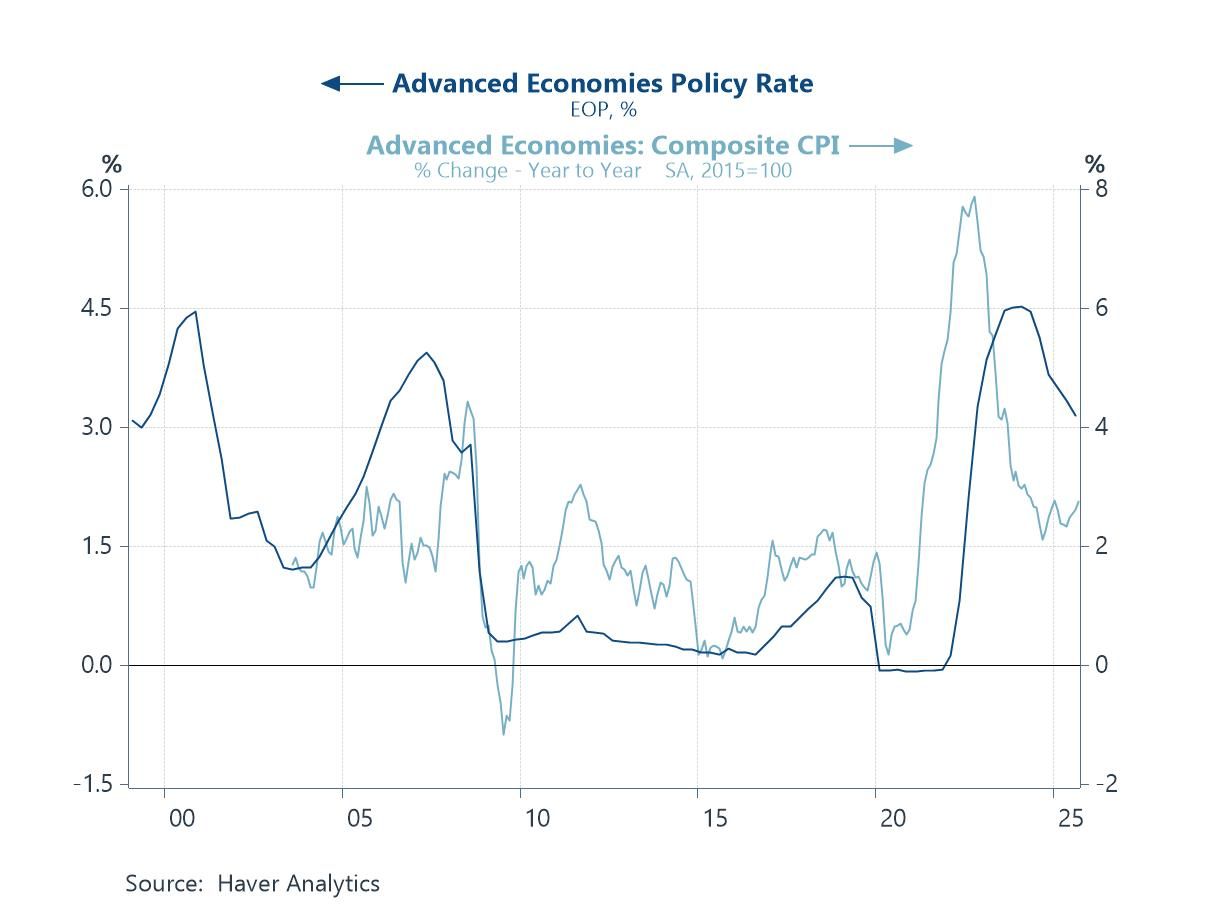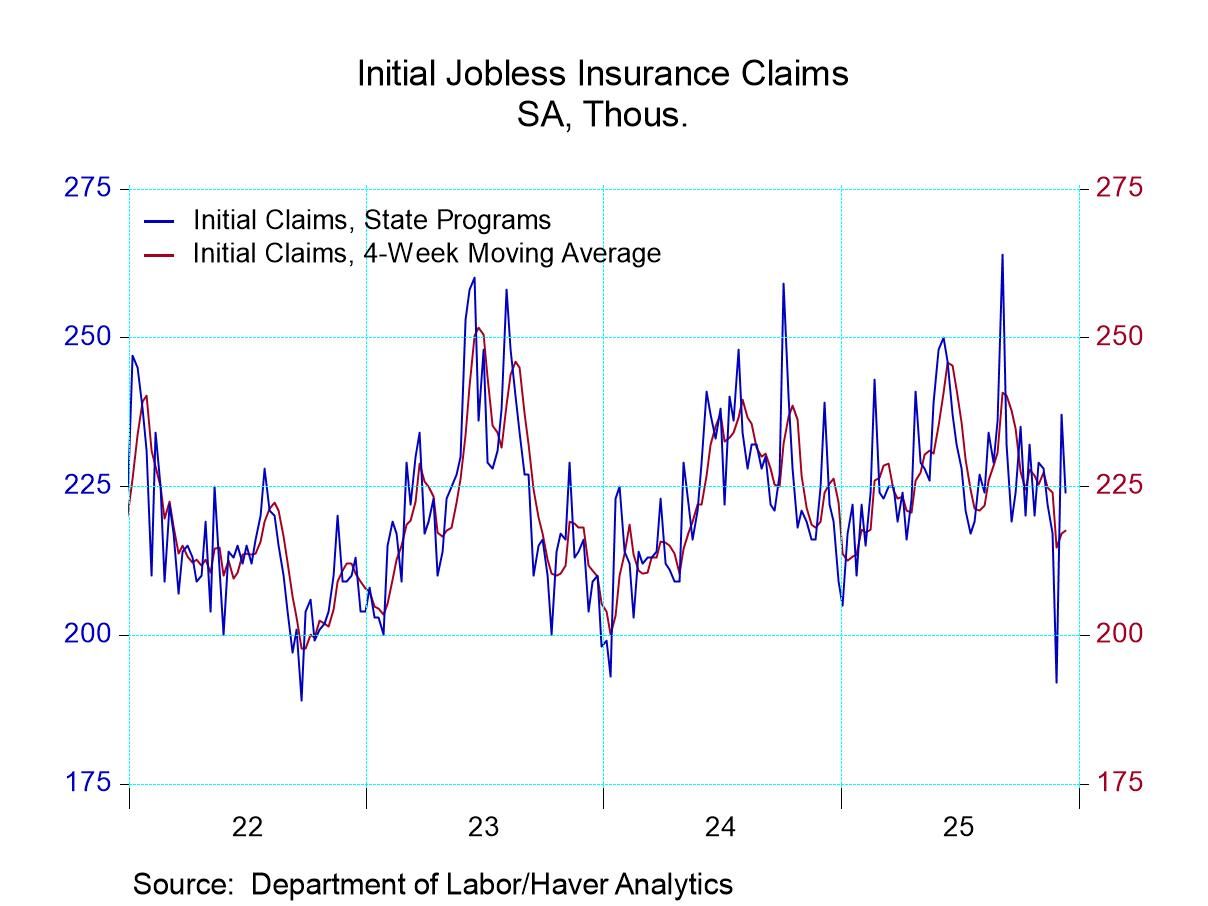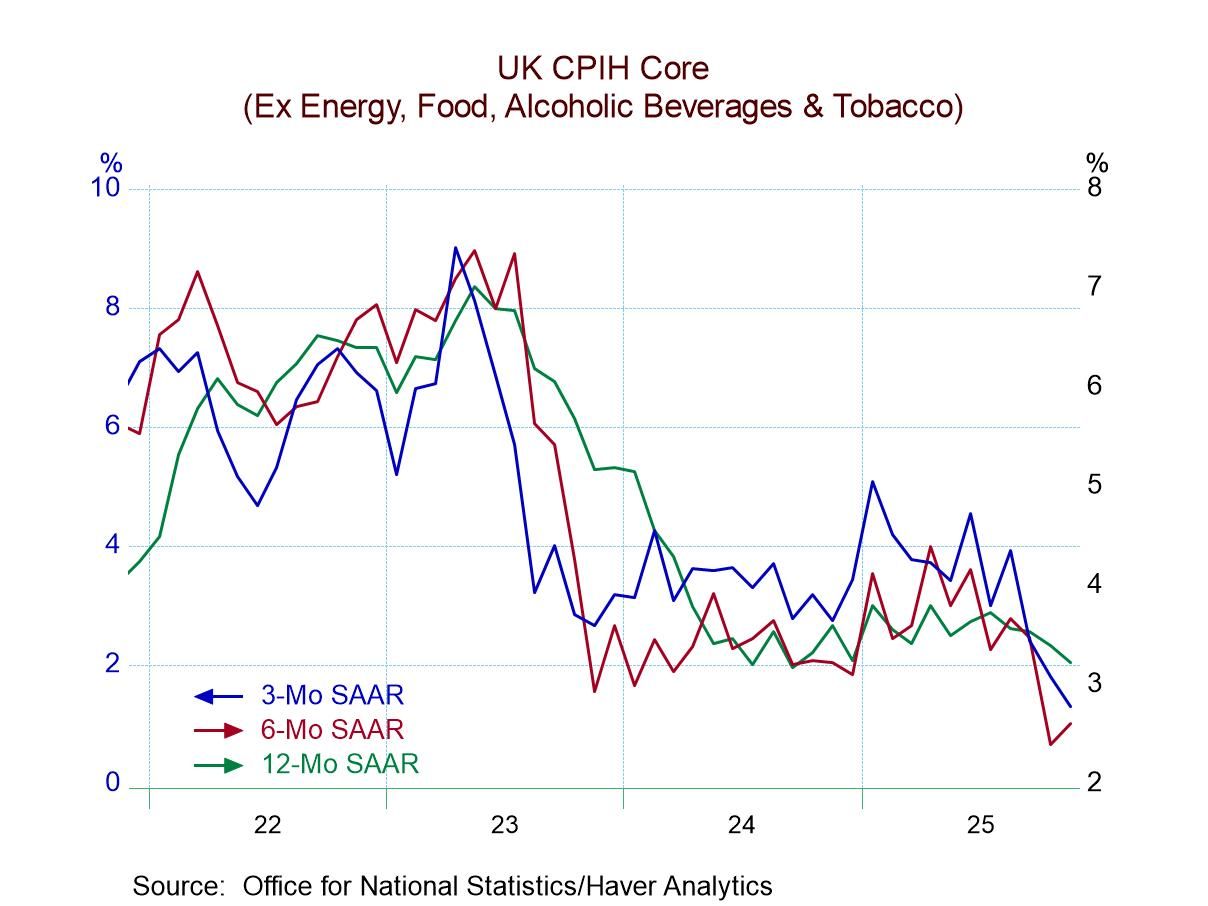 Global| Jul 26 2005
Global| Jul 26 2005Consumer Confidence Retraced Earlier Gain
by:Tom Moeller
|in:Economy in Brief
Summary
Consumer Confidence in July retraced the prior month's upwardly revised increase and fell 2.8% to 103.2 according to the Conference Board. Consensus expectations had been for stability at 106.2. During the last twenty years there has [...]
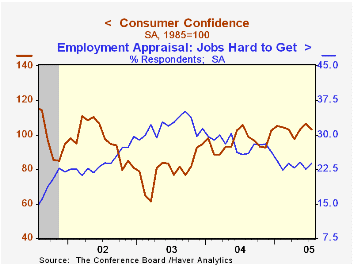
Consumer Confidence in July retraced the prior month's upwardly revised increase and fell 2.8% to 103.2 according to the Conference Board. Consensus expectations had been for stability at 106.2.
During the last twenty years there has been a 52% correlation between the level of consumer confidence and the y/y change in real consumer spending. The correlation rose to 66% during the last ten years.
Consumers' assessment of the present situation slipped for only the second month this year and the index remained up 11.4% y/y. Jobs were viewed as hard to get by 23.8% of survey participants, a slight m/m increase, but the 28.7% of participants who thought that business conditions were good was the highest in four years.
Consumer expectations fell 3.5% (-11.7% y/y) to the lowest level since April. Expectations for business conditions slipped the most though expectations that jobs would increase improved and expectations that income would rise only fell modestly.
The Conference Board’s survey isconducted by a mailed questionnaire to 5,000 households and about 3,500 typically respond.
| Conference Board | July | June | Y/Y | 2004 | 2003 | 2002 |
|---|---|---|---|---|---|---|
| Consumer Confidence | 103.2 | 106.2 | -2.4% | 96.1 | 79.8 | 96.6 |
by Tom Moeller July 26, 2005
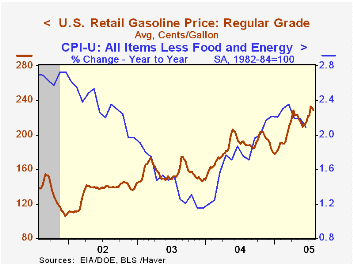
In the US, the average price for unleaded regular gasoline dipped to $2.29 per gallon last week from $2.32 or more during the prior two weeks. Early month strength lifted the July average so far 6.2% above June. In 2005 gasoline prices have averaged $2.10 per gallon of regular grade versus $1.85 last year.
The price of crude oil also has fallen of late with a barrel of West Texas Intermediate crude yesterday at $56.01. Earlier in the month crude oil prices briefly touched $61.29/bbl. and have averaged $58.60 in July versus $41.44 during 2004.
Wholesale natural gas prices held steady at $7.77/mmbtu (33.0% y/y) last week. The average price during July is up 7.2% versus June.
For the latest Short Term Energy Outlook from the US Department of Energy click here.
| Energy Prices | 07/25/05 | 12/31/04 | Y/Y | 2004 | 2003 | 2002 |
|---|---|---|---|---|---|---|
| US Retail Gasoline, Regular ($/Gal.) | $2.29 | $1.79 | 20.2% | $1.85 | $1.56 | $1.35 |
| Domestic Spot Market Price: West Texas Intermediate ($/Barrel) | $57.47 | $41.78 | 40.7% | $41.78 | $32.78 | $31.23 |
by Tom Moeller July 26, 2005

Chain store sales increased 0.4% last week according to the International Council of Shopping Centers (ICSC)-UBS survey. This fourth consecutive gain lifted sales so far in July 0.5% higher than during June when sales fell 0.4% versus May.
During the last ten years there has been a 56% correlation between the y/y change in chain store sales and the change in non-auto retail sales less gasoline, as published by the US Census Department. Chain store sales correspond directly with roughly 14% of non-auto retail sales less gasoline.
The leading indicator of chain store sales from ICSC recovered a piece of the prior week's sharp decline with a 0.3% w/w (0.3% y/y) rise.
The ICSC-UBS retail chain-store sales index is constructed using the same-store sales (stores open for one year) reported by 78 stores of seven retailers: Dayton Hudson, Federated, Kmart, May, J.C. Penney, Sears and Wal-Mart.
| ICSC-UBS (SA, 1977=100) | 07/23/05 | 07/16/05 | Y/Y | 2004 | 2003 | 2002 |
|---|---|---|---|---|---|---|
| Total Weekly Chain Store Sales | 458.5 | 456.9 | 4.2% | 4.6% | 2.9% | 3.6% |
by Louise Curley July 26, 2005
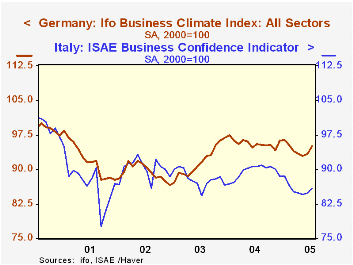
The decline of 11% in the euro to around 1.20 against the US dollar from 1.35 at the end of last year seems to have boosted business confidence in Germany and Italy. Business confidence in Italy and Germany rose for the second month in July to five month highs. In Italy, the ISAE (Institute of Studies and Economic Analyses) index of business confidence rose 1.3% from June to July, but was still 5.1% below July of last year. The IFO (Institut fur Wirtschaftsforschung) index in Germany rose 1.8% from June to July and was only 0.5% below July, 2004. Business confidence in Italy is some 14% below 2000 while that of Germany is only 5% below 2000. The first chart shows the business confidence indexes for Germany and Italy.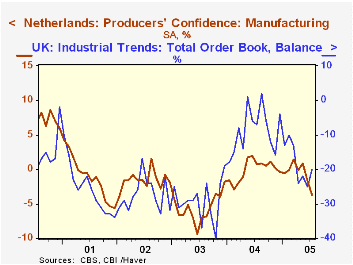
The 9% decline in the British pound from $1.92 at the end of last year to around $1.75 currently may also have accounted for the improvement in confidence shown in the CBI (Confederation of British Industries) Industrial Trends Survey. As in Italy, the improvement is from a low level. The balance of respondents reporting on the volume of their order books rose to a negative 20 from a negative 25 from June to July. Despite the decline of the euro, business confidence in the Netherlands continued to weaken. In July pessimists in the Netherlands out weighed the optimists by 3.7% a 2 point increase from the 1.7% in June. The second charts shows the percent balances for the U. K. and the Netherlands.
| Jul 05 | Jun 05 | Jul 04 | M/M% | Y/Y% | 2004 | 2003 | 2002 | |
|---|---|---|---|---|---|---|---|---|
| Germany: IFO (2000=100) | 95.0 | 93.3 | 95.5 | 1.82 | -0.52 | 95.7 | 91.7 | 89.4 |
| Italy ISAE (2000=100) | 86.0 | 84.9 | 90.6 | 1.30 | -5.08 | 89.5 | 88.0 | 90.1 |
| Netherlands Producer Confidence (% balance) | -3.7 | -1.7 | 0.7 | -2.0 | -4.4 | 0.1 | -5.6 | -1.5 |
| U.K. CBI Industrial Trends Survey Order Book in volume (% balance) | -20 | -25 | -7 | 5 | -13 | -9 | -29 | -27 |
Tom Moeller
AuthorMore in Author Profile »Prior to joining Haver Analytics in 2000, Mr. Moeller worked as the Economist at Chancellor Capital Management from 1985 to 1999. There, he developed comprehensive economic forecasts and interpreted economic data for equity and fixed income portfolio managers. Also at Chancellor, Mr. Moeller worked as an equity analyst and was responsible for researching and rating companies in the economically sensitive automobile and housing industries for investment in Chancellor’s equity portfolio. Prior to joining Chancellor, Mr. Moeller was an Economist at Citibank from 1979 to 1984. He also analyzed pricing behavior in the metals industry for the Council on Wage and Price Stability in Washington, D.C. In 1999, Mr. Moeller received the award for most accurate forecast from the Forecasters' Club of New York. From 1990 to 1992 he was President of the New York Association for Business Economists. Mr. Moeller earned an M.B.A. in Finance from Fordham University, where he graduated in 1987. He holds a Bachelor of Arts in Economics from George Washington University.



